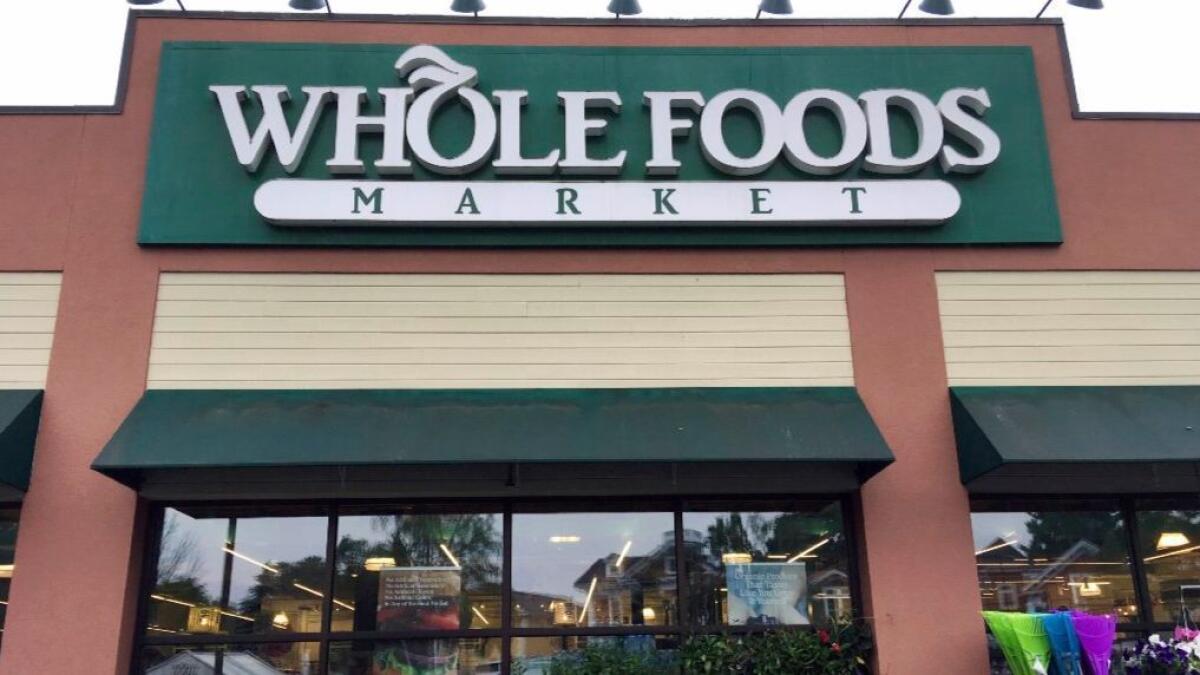Whole Foods drew interest from other potential suitors before striking Amazon deal

Two grocery companies and four private-equity firms expressed interest in possibly merging with Whole Foods Market Inc. or having some other business tie-up before the high-end grocery chain agreed to be bought by Amazon.com for $13.7 billion, a regulatory filing showed Friday.
None of the potential suitors was identified in the filing, which was the proxy statement for Whole Foods’ stockholders to vote on the deal.
One of the grocery companies, identified in the filing only as an “industry participant” called “Company X,” was privately held Albertsons, which also owns Vons and Pavilions, according to Reuters, citing one unidentified source.
Albertsons spokeswoman Christine Wilcox declined comment.
Amazon also told Whole Foods that the e-commerce giant would not engage in a bidding war with other suitors and that the $42 a share it has agreed to pay in the merger was Amazon’s “best and final offer,” the filing said.
The U.S. grocery industry was jolted June 16 when Amazon announced the deal for Whole Foods, a 465-store chain that focuses on natural and organic foods and has nearly $16 billion in annual sales.
Amazon is widely expected to bring to the grocery industry the same technological and logistics innovation and downward pressure on prices that it’s achieved in selling books, electronics and other merchandise.
The $42 price amounted to a 27% premium above where Whole Foods’ stock had closed the prior day.
In the days after the merger announcement, Whole Foods’ stock traded above $43 a share, signaling that investors believed a rival offer might be coming. But the stock has since fallen back and stood at $42.07 in afternoon trading Friday.
The merger plans took shape because Whole Foods, based in Austin, Texas, has been struggling in recent years as Albertsons and other supermarket chains beefed up their offerings of natural and organic groceries.
In April, activist investor Jana Partners bought an 8.8% stake in Whole Foods and pressed its management for a possible sale or other corporate restructuring.
That sparked the overtures from Company X and another “industry participant” that the filing called “Company Y,” along with the private-equity firms, the filing said.
Company X proposed a “merger-of-equals” that was “potentially valued at $35 to $40 a share,” but the other potential suitors did not make any specific proposals, the filing said.
Whole Foods, in turn, did “not solicit proposals from the private-equity firms” in part because it worried about sale talks being leaked to the public and because it believed Amazon’s offer “likely exceeded the price level” a private-equity firm would be expected to pay, the filing said.
After Whole Foods reached out to Amazon on April 21, Amazon a month later initially offered $41 a share for the company. On May 30, Whole Foods countered by asking for $45 a share, the filing said.
Amazon responded by telling Whole Foods it “would disengage from its efforts to acquire” Whole Foods “if the $42 per share price were not accepted and that Amazon.com expected that [Whole Foods] would not approach other potential bidders while the company was negotiating with Amazon.com.”
Twitter: @PeltzLATimes
More to Read
Inside the business of entertainment
The Wide Shot brings you news, analysis and insights on everything from streaming wars to production — and what it all means for the future.
You may occasionally receive promotional content from the Los Angeles Times.











